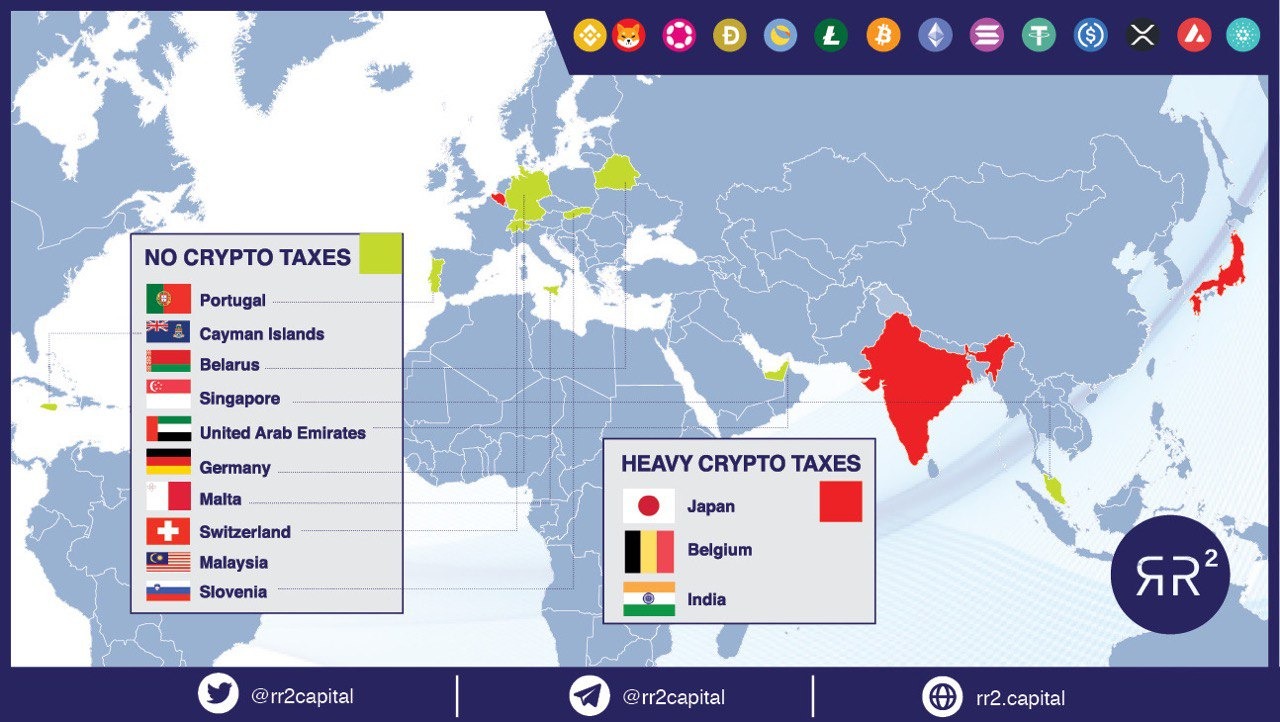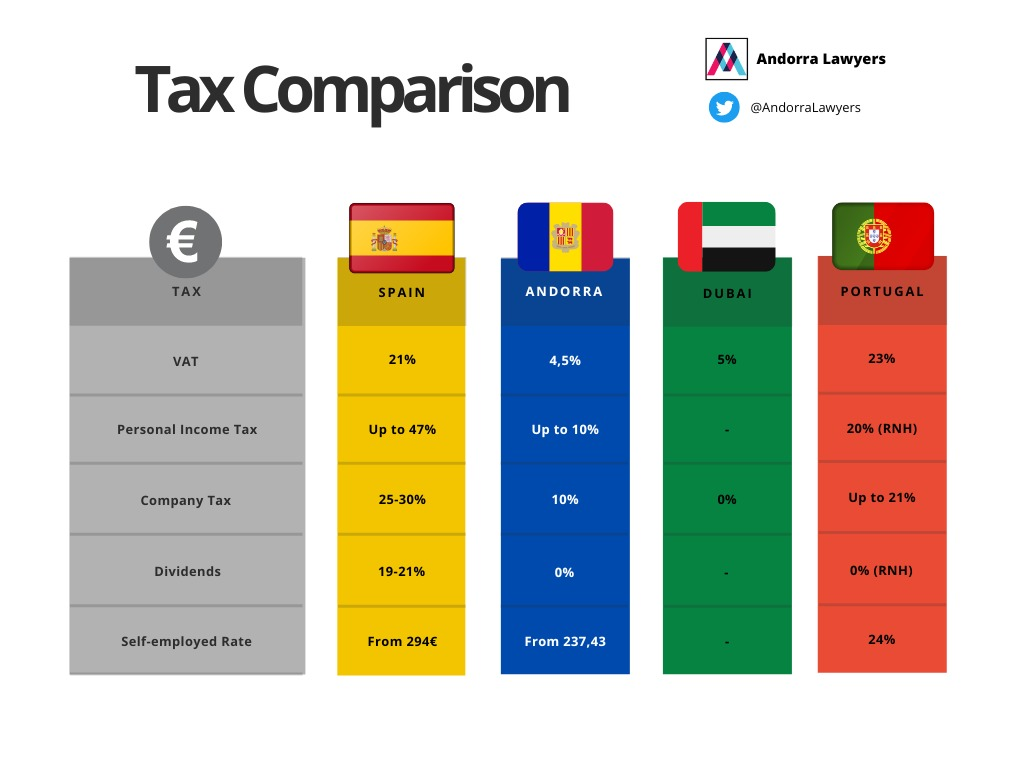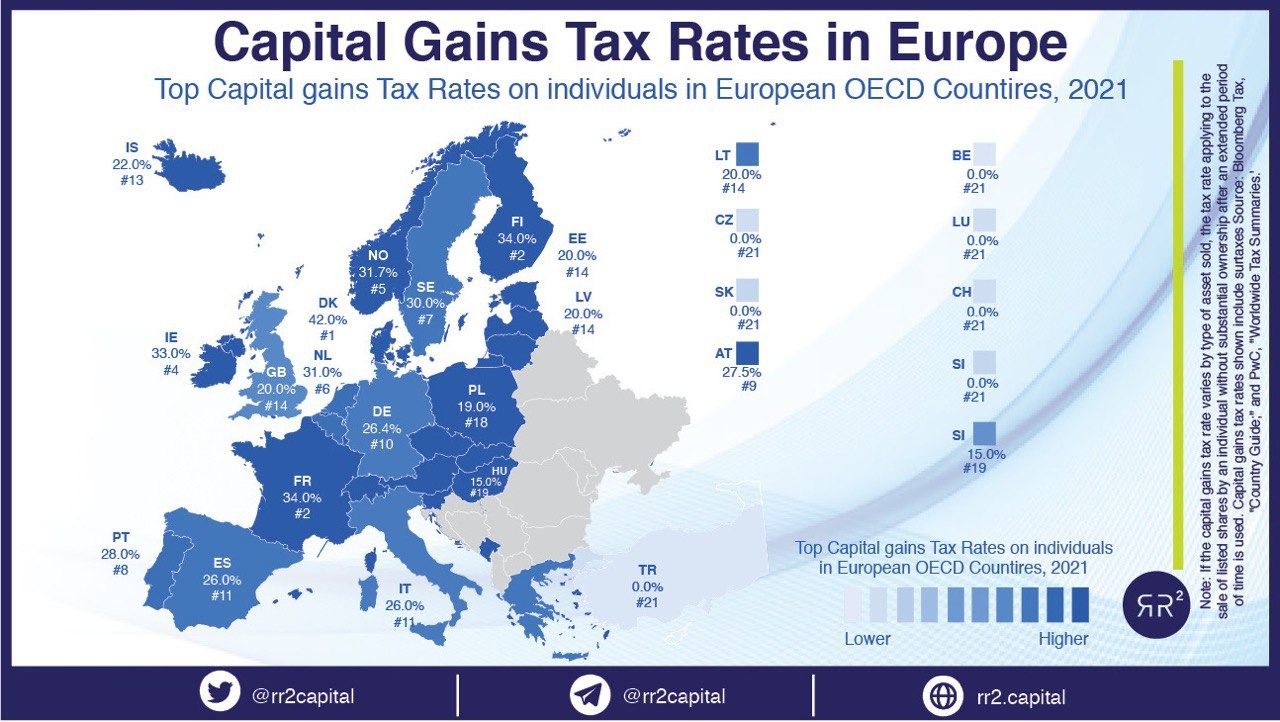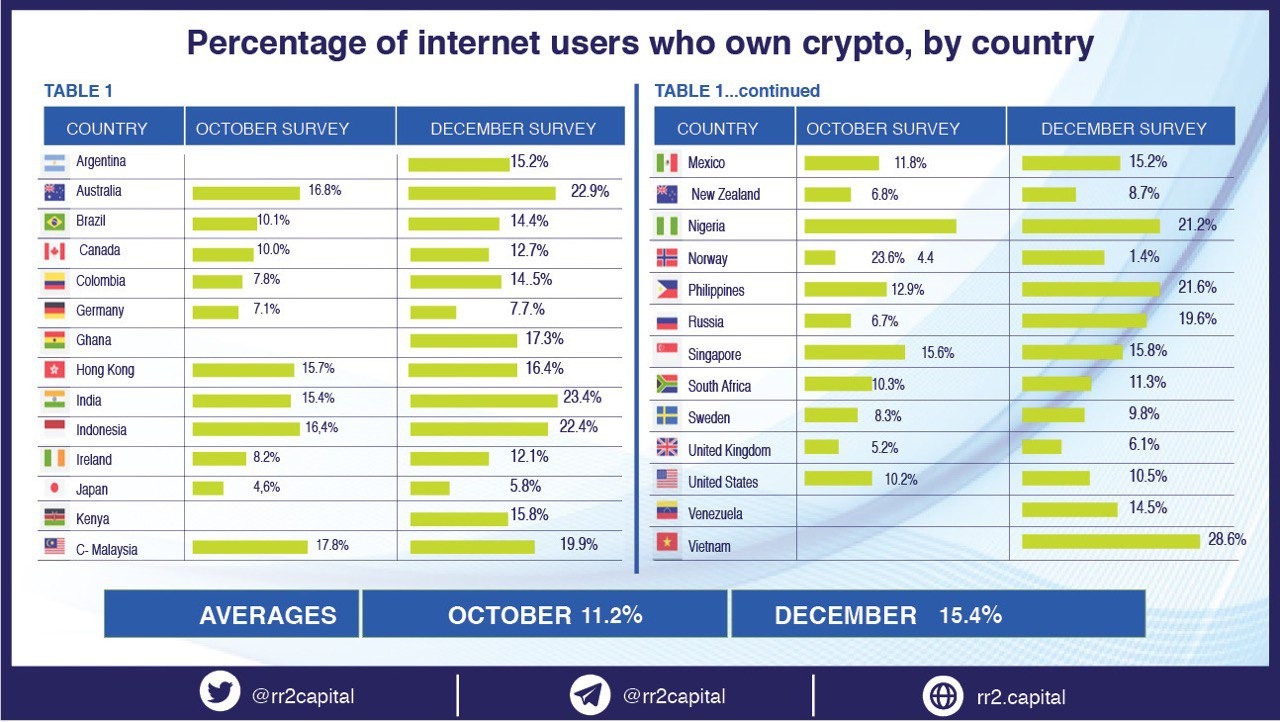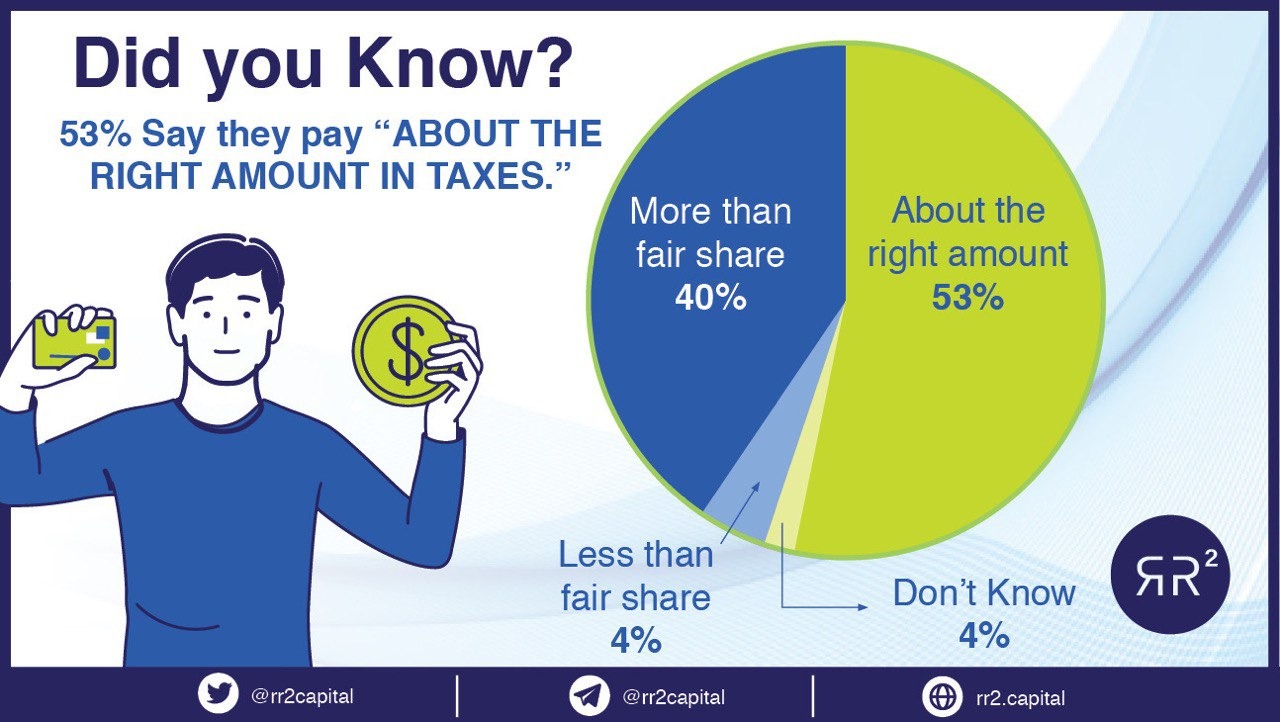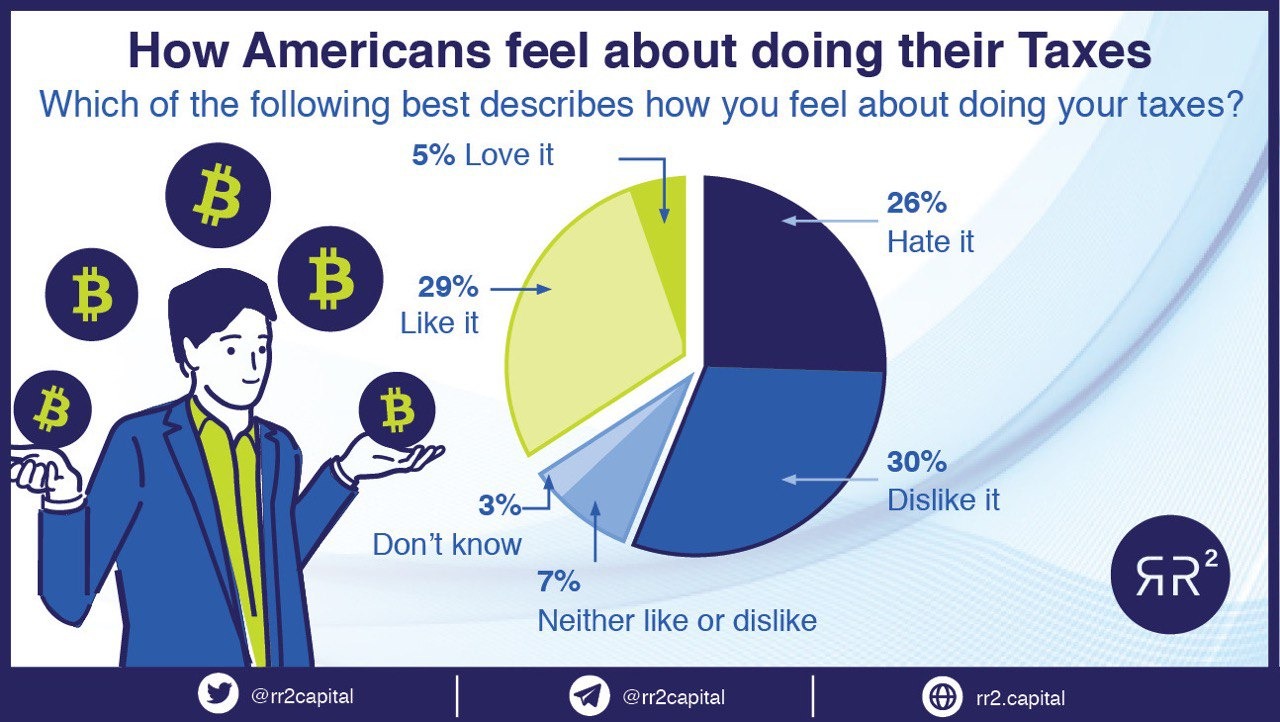Tax is a major concern for almost any investor, especially for crypto investors. While some countries seek to discourage investment in digital assets by imposing hefty taxes on profits, others are taking a more positive approach with the goal of enabling growth and development within the industry.
Some crypto-friendly countries have adopted legislation that allows for the purchase, sale and storage of digital assets without any tax consequences to the buyer, seller, or hodler. This approach has proven to promote greater adoption and boost investor confidence.
Everyone enjoys a good tax break, so here’s our list of countries with no crypto taxes, updated for 2022.
Andorra
Andorra is a microstate located between Spain and France, but is not part of the European Union. This Principality has one of the lowest crime rates in the world, it is the fifth safest country in the world according to the World Bank report. However, in addition to the low crime rate, nature, strategic geographical location, climate and gastronomy, Andorra has a great attraction: the low taxes.
Currently Andorra has the following main taxes for its citizens:
- Corporate taxes: The maximum rate of this tax is 10% for all companies created in Andorra.
- Personal Income Tax: This tax also has a maximum rate of 10%. However, it must be taken into account that the first 24.000€ are exempted, the following 16.000€ are taxed at a rate of 5% and the rest at 10%.
- Dividends obtained by Andorran companies to Andorran residents are totally tax exempt.
- VAT is 4.5%, the lowest in Europe.
All this makes many businessmen seek to reside in Andorra effectively, in order to be able to pay their taxes in the country. It is easy to obtain residency in Andorra.
In addition to its taxes, the real estate sector in the Principality is currently booming. Many new homes are being built, including 5 towers of more than 16 floors, the starting price of each house is €800,000 minimum.
Finally, as for the blockchain sector, Andorra is in favor of the use of new technologies and there is already regulation in this regard.
Portugal
Portugal has one of the most crypto-friendly tax systems in the world. If you’re looking to minimize your cryptocurrency taxes, Portugal is a great option. Since 2018, all proceeds from selling cryptocurrency have been tax-free. You’ll be happy to know that crypto trading is also tax-free.
Provided you’re not a business, your crypto is also exempt from Value Added Tax (VAT) and income tax in Portugal. This means that all crypto profits generated by individuals are completely tax-free.
There was some indication from the government in 2022 that this might change in the near future.
The Cayman Islands
This list probably wouldn’t be complete without the Cayman Islands, often dubbed as one of the most controversial countries in the world of taxation.
The Cayman Islands is among those countries to not impose tax on crypto assets. There is no capital gains or personal income tax levied by the Cayman Islands Monetary Authority. Furthermore, the Cayman Islands Monetary Authority imposes no corporate tax on businesses.
No matter if you’re an individual or a company in the Cayman Islands, you will not be taxed at all. While it may be the perfect crypto tax haven, the Cayman Islands has an extremely high cost of living as its main source of income is from luxury goods and tourism.
Belarus
Belarus is yet another country taking a different approach towards cryptocurrencies. In 2018, the Eastern European country legalized all crypto activities, exempting individuals and companies involved, buying, selling and trading crypto from paying taxes until 2023. In 2023, the authority is set to review the regulations.
According to the legislation, all crypto activities, including mining and day trading are viewed as personal investments, making them exempt from both capital gains and income tax until 2023.
While Belarus is currently a crypto tax haven this could change after 2023, only time will tell.
Singapore
Singapore is home to some of the world’s most popular crypto exchanges including Crypto.com. For both individuals and corporations, Singapore provides a welcoming tax shelter for virtual currencies.
Singapore has no capital gains tax, both individuals and corporations are exempt from paying capital gains taxes. This means that you will not have to pay taxes on crypto when you buy, sell or trade.
As an added bonus, since cryptocurrencies are considered intangible property for tax purposes, exchanging them for tangible goods and services is treated as a barter deal rather than a payment. As a result, the Goods and Services Tax (GST) may apply to the underlying services or products, but not the payment coin or token themselves.
If, however, you run a company in Singapore and its primary function is crypto trading, the company is still subject to income taxes.
United Arab Emirates (UAE)
The United Arab Emirates (UAE) has zero personal income tax. Furthermore, the country does not recognize cryptocurrencies as legal tender, but rather as an investment asset. Since the UAE has no personal income tax, capital gains taxes are not imposed. This means that you can buy, sell, trade crypto in the UAE without the need to worry about the tax implications.
Most other countries treat income in the form of cryptocurrency as a capital gain and are, therefore, required to pay hefty capital gains tax. Unlike other countries, income in the form of cryptocurrency is not treated as a capital gain in the UAE.
Various people working in the crypto industry are often paid their salaries in crypto and are forced to convert them to fiat currency, causing them to be subject to hefty income tax of 30% in countries such as India. Since there is no income tax, crypto investors don’t need to file a tax return in the UAE.
Germany
When it comes to the taxation of digital assets, Germany provides a novel approach. In contrast to many countries in Europe, Germany considers cryptocurrency to be a private asset and not a capital asset. This means that if you hold your cryptocurrency for more than one year, you will not be subject to income tax or capital gains tax, provided that the sale price is less than €600.
With regards to crypto staking, Germany also takes a novel approach. If you stake your cryptocurrency and you generate an income from it, you will not have to pay cryptocurrency tax, provided that you have kept it for more than 10 years. Your staked cryptocurrency will be completely tax-free only after 10 years.
Companies are, however, treated differently, a business in Germany must nevertheless pay corporate income taxes on crypto earnings just as it would with any other asset.
Malta
Malta, is often referred to as the “blockchain island”. This is because crypto is officially recognized in the government as both a store of value and a medium of exchange.
In Malta, you will pay no capital gains taxes on long-term gains from cryptocurrency, provided that it is recognized as a ‘store of value.’ This is positive news for crypto investors.
When it comes to crypto trading, however, the Maltese government views this a similar operation as trading stocks or shares and is subject to 35% tax. The Maltese tax authorities look at things like where you live and how much money you make trading cryptocurrencies to make that determination. If you fall within a certain bracket, you could pay anything from 0%-5% on your crypto profits.
Switzerland
Switzerland is often referred to as “Crypto Valley”. Zug, Switzerland is the hub for blockchained-based and digital currency startups, this contributed to the reference of Crypto Valley.
In Switzerland, as long as you’re not a professional trader, your crypto gains are not subject to capital gains. This means that, as an individual investor, selling and trading crypto is tax-free, provided that it is not your primary occupation.
If, however, you’re a professional crypto trader or a crypto miner, you’ll be subject to both an income tax and a wealth tax. The taxable income will depend on how much revenue you generate every year.
Malaysia
Malaysia doesn’t consider cryptocurrencies to be capital assets. Further, the government of Malaysia also doesn’t consider cryptocurrencies to be legal tender.
This means that crypto transactions are tax-free. Furthermore, cryptocurrencies don’t qualify for capital gains tax, since the government doesn’t recognize digital currencies as legal tender.
Unfortunately, for day traders, things are slightly different. According to The Malaysian Inland Revenue Board cryptocurrency transactions are only exempt from tax when they are not regular or repetitive. Therefore, if you’re a professional day trader, you will still have to pay taxes on your crypto.
Similarly for businesses, all profits are subject to income tax, regardless of whether the profits are in crypto or fiat.
Slovenia
Slovenia treats individuals and businesses differently under its crypto tax system. Prior to April 2022, the country levied no tax on individuals for the purchase sale or use of virtual currency.
The country, however, recently adopted a bill that would impose a 5% tax on natural persons when they turn their cryptocurrency into a fiat currency or buy goods or services, but only if the sum exceeds EUR 10,000 a year.
This means that each natural person can redeem EUR 10,000 worth of virtual currencies a year tax-free, anything profits thereafter is taxed at a rate of 5%.
Countries With The Highest Crypto Tax
Now that we know the countries with little to no crypto tax, let’s take a look at some of the countries with the highest taxes for crypto.
Japan
Japan has the world’s highest crypto tax with crypto profits taxed at a maximum rate of 55%. Cryptocurrency is viewed as property and is taxed in Japan as Miscellaneous Income. Furthermore, corporate crypto holdings are subject to a 30% flat tax on all gains.
If you buy cryptocurrency, keep it in storage, or transfer it between wallets, you will incur no tax consequences.
If you made more than 200,000 JPY by buying or selling cryptocurrencies in the last fiscal year, you are required to report the amount of cryptocurrency you traded on your Income Tax return. An individual’s income tax rates vary depending on their tax bracket, however, Japanese citizens could have to pay a maximum of 55% on their crypto gains.
The Japanese government has, however, hinted at the prospect of lowering the crypto tax rates.
Belgium
In Belgium, your crypto taxation rates have the potential to reach a maximum of 50%. For businesses that generate a profit through trading crypto, the regular corporate income tax regulations will apply.
The situation is more nuanced for individuals. The thing that really matters is whether or not your Bitcoin activity is best categorized as a hobby or as your profession (professional trader). How bitcoin is invested has a significant impact on whether or not it can be deducted from your taxable income.
If trading crypto is your day job, all profits you make will be taxed as personal income. Taxes would be assessed at conventional progressive rates ranging from 25% to 50%.
If, however, crypto trading is not your day job or your main source of income, any profits generated from transactions that qualify as “ordinary management of private assets” will be excluded from income tax.
Investments that involve significant levels of risk and fall outside the purview of the Prudent Man-principle are considered to have a speculative nature in the perspective of the Belgian tax authority. If that’s the case, the capital gain will be treated as unspecified income and subject to a 33% flat tax rate.
India
From April 2022, India introduced a tax on all Virtual Digital Assets (VDAs). The law states that any income earned from the transfer of digital assets would be taxed at a flat rate 30%. This law applies to the gifting of digital assets as well.
According to the legislation, where a person earns an income from the transfer of a VDA, the income earned by that person less the cost price, if any, is subject to tax at the rate of 30%. Additionally, an equalization levy of 2% will be levied on the non-resident owner of the blockchain on which NFTs are traded.
What Is Considered A Taxable Event Relating To Crypto?
Taxable events relating to cryptocurrency can often bring about confusion. Below is a list of taxable events relating to crypto in most countries:
- Exchanging crypto for government-issued fiat currency (selling your crypto).
- Paying for things using crypto, like goods, services, or property.
- Exchanging one crypto for another crypto.
- Receiving mined crypto.
- Receiving forked crypto.
Non-Taxable Events Relating To Crypto
The following are examples of non-taxable events relating to crypto:
- Buying crypto with fiat currency.
- Donating crypto to a charitable organization.
- Transferring crypto between personal wallets.
Do I Pay Crypto Tax If I Don’t Sell?
No, you only have to pay taxes on your crypto holdings when you realize a gain. You can only realize a gain when you either sell, spend, or exchange your crypto.
Simply holding your cryptocurrency in a wallet is not a taxable event.
How To Minimize Your Crypto tax
While it’s impossible to avoid crypto tax, unless you live in a country that has zero taxes on crypto, there are ways you can minimize your tax liability, legally.
Hold On For Dear Life (HODL)
The easiest way to avoid taxes is to simply HODL. Generally, if you hold your crypto for at least one year before selling, you can reduce your tax bill. In most countries, you’ll be able to take advantage of a lower tax rate on your profits if you were to hold for at least one year instead of selling within a short period after purchasing.
In the US, crypto investors are given a reduced tax rate for assets held for more than a year. Depending on a person’s tax bracket, an investor can lower their cryptocurrency taxes to anything from 0%-20% by simply holding for more than one year.
Take Crypto Profits In A Low-Income Tax Year
In some countries, the tax rate you pay on cryptocurrency is based on your income bracket within any given year. Selling your crypto in a low-income year can help reduce your tax for both long-term and short-term capital gains. Depending on your country, your income usually determines the tax rate you pay, so selling during a low-income year could potentially reduce your chances of being pushed up into a higher income tax bracket for the tax year.
Take Advantage Of Tax-Free Thresholds
Some countries offer generous tax-free thresholds which can come in handy when it comes to crypto taxes. Knowing your tax-free thresholds can help you reduce your crypto tax bill.
For example, British taxpayers only have to pay capital gains tax on their overall gains above their tax-free allowance (Annual Exempt Amount). This tax-free allowance is: £12,300. In Germany, profits under €600 per year are tax-free, provided the asset has been held for more than one year. In the US, investors also pay no capital gains tax provided that their gross income is under $41,676 a year.
Offset Capital Gains With Capital Losses
Whenever you sell an investment, you will either realize a gain or a loss. When it comes to taxes, you can use your capital losses to your advantage. This means that if you sold Bitcoin and made a profit of $50,000, but lost $50,000 selling your Ethereum holdings in the same year, you wouldn’t owe any tax because you never made a profit. If you have an overall capital loss for a year, this means you would essentially pay no capital gains tax. This process is called tax-loss harvesting.
Donations To Charities
If you give to a charity that meets certain requirements, your donation may be eligible for a tax deduction. In some cases, a donor may receive a tax deduction for donating cryptocurrency or another asset. The cryptocurrency’s fair market value can be deducted without incurring any capital gains tax.
Gift To A Family Member
Gifting cryptocurrency, on the other hand, may be an excellent method to spread your wealth, while strategically reducing your tax bill. In the US, for example, taxpayers enjoy an annual $16,000 gift tax exclusion, which applies to each person you give a gift to.
While it may seem hard to believe at first, however, by strategically gifting your crypto, you can avoid paying capital gains tax on a portion the crypto you dispose of. This can ultimately reduce how much tax you owe, while simultaneously increasing your family’s wealth. Doesn’t this seem like a no-brainer now?
Move To A Country With No Crypto Taxes
While this may seem like an extreme step to take, many high level investors often choose to relocate to different countries with no crypto taxes. As seen at the beginning of this article, there are various tax safe havens for crypto investors. If you plan to invest a large amount of capital in cryptocurrencies or you’re thinking about starting a crypto company, then it may be worth moving to a country with little to no tax on cryptocurrencies.
How To Keep Track Of Crypto Gains For Tax?
Not keeping a detailed record of crypto transactions is something most people are guilty of. If you live in a country that taxes cryptocurrency, it’s important that you make an effort in keeping track of all of your crypto transactions. Over the past few years many cryptocurrency exchanges have fallen victim to hacks and shutdowns, causing users to lose the ability to access and download their trading history. This has the potential to cause havoc when users try and calculate their taxes a few months down the line. When it comes time to file crypto taxes, you don’t want to find yourself in a situation where you owe far more tax than you budgeted for.
Ideally, for tax purposes and tax calculations, you should always have the following information readily available:
- Type of crypto (for example, BTC or ETH).
- Date of the transaction.
- Type of transaction (buy, sell, exchange).
- Number of coins/tokens.
- Value of the transaction.
- Not usually necessary, but good to have on hand: bank statements and wallet addresses, if needed for an inquiry or review.
Luckily, there’s no need to manually store all of this data. There are various cryptocurrency tax software that can help make preparing tax returns simple and stress-free.
There’s no need to spend hours trying to calculate your capital gains when you can automatically integrate your crypto transactions from exchanges like Binance, Bitfinex and MEXC Global in a matter of minutes.
Here is a list of some of the most popular software tools used to swiftly generate crypto tax reports:
It’s important to remember that tax can often be a difficult task to master, especially when it comes to cryptocurrencies and things like capital gains. Sometimes you or your business may need more guidance than what you’ll be able to find on the internet.
You may find it useful to consult a tax professional for advice on cryptocurrency tax reporting or to assist you with any tax related questions you may have.
About RR² Capital
RR² Capital is a Lisbon-based Venture Capital (VC) firm empowering the ‘new internet’. RR² specializes in disruptive technology spaces such as decentralized ledger technology, Artificial Intelligence (AI), machine learning and virtual assets. They believe that many traditional businesses and organizations will implement these technologies, adding immense value to the core of those businesses.
RR² Capital’s mission is to capture value by investing in early stage projects and teams who are leading innovation and disruption within the Web 3.0 space. The team operates a strategy centered on a long-term vision, developing long standing relationships, utilizing trusted advisors in decision-making, building an integrated network of first-movers and instilling the trait of flexibility in its team.
This has positioned RR² Capital as experts in value creation, reporting 1,011% returns across a portfolio of 140+ investments in 2022.
For more information about RR² Capital and our expansive disruptive technology-focussed investment portfolio, visit our website here or send us a mail here.
Follow RR² Capital on Twitter.


